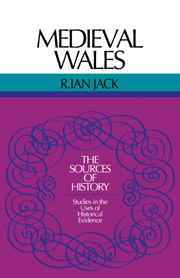Book contents
- Frontmatter
- Contents
- Abbreviations
- General Editor's Introduction
- Preface
- 1 Literary Sources
- 2 The Official Records of Wales and Their Preservation
- 3 The Records of the English Government
- 4 Archives of Individuals and Corporations
- 5 Ecclesiastical Records
- 6 The Antiquaries
- 7 Archaeology and Numismatics
- 8 Cartography and Place-Names
- 9 Conclusion
- Index
4 - Archives of Individuals and Corporations
Published online by Cambridge University Press: 07 October 2011
- Frontmatter
- Contents
- Abbreviations
- General Editor's Introduction
- Preface
- 1 Literary Sources
- 2 The Official Records of Wales and Their Preservation
- 3 The Records of the English Government
- 4 Archives of Individuals and Corporations
- 5 Ecclesiastical Records
- 6 The Antiquaries
- 7 Archaeology and Numismatics
- 8 Cartography and Place-Names
- 9 Conclusion
- Index
Summary
The largest single category of record surviving from medieval Wales comprises the various accounts, court rolls, rentals, surveys, deeds and so forth created by the day-to-day administration, the consolidation and acquisition of estates, lay and ecclesiastical, in what is now Wales. Unlike the situation obtaining in most other categories of Welsh sources, the sheer bulk is quite daunting. But, despite the quantity, there are very few long, consecutive runs of such estate documents: this makes the thousands of account rolls less meaningful than they would be if individual properties had continuous series, year after year for a prolonged period. Court rolls are usually better preserved, for they contain the evidence of every copyholder's title and precedents for future cases: sooner or later, they are often dispersed or neglected, but they stood a better chance than account rolls of surviving into relatively modern times. Rentals were renewed infrequently, and surveys were taken usually for special purposes, so these are not common among the surviving records. Deeds, which are necessary to every lord and corporation to prove title to the various elements of the estate in an age of excessive litigation over landed property, are still very numerous, either in their original form, or in copies enrolled at the landholder's expense on the dorse of the Close rolls in the royal Chancery, or in the compilations known as cartularies.
- Type
- Chapter
- Information
- Medieval Wales , pp. 101 - 124Publisher: Cambridge University PressPrint publication year: 1976



